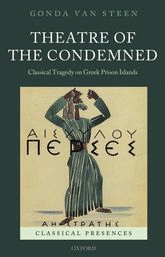By Amy Muse
Within Modern Greek history, the Greek Civil War (1946-1949), as with most countries’ civil wars, was its most complicated, brutal, and lastingly fractious conflict, with aftershocks that reverberated for the two decades that followed and are still felt in the political system today. One of those aftershocks took the form of post-war internment camps on remote islands to “reeducate” or “cleanse” members of the losing communist side. On these prison islands, Gonda Van Steen has discovered, ancient tragedies were staged. Theatre of the Condemned examines this phenomenon of inmate theatre as a cultural form of the Greek Civil War that, among other things, initiated the “democratic turn” in theatre and classical drama—in which “theatre performance started to present itself as an alternative and more democratic discourse of analysis”—a move that has usually been dated later, in the 1960s.
A specialist in modern productions of ancient Greek drama, Van Steen has combed little-visited Greek archives and interviewed prison camp survivors (many of them leftist theatre artists) to excavate, piece together, and interpret this previously almost-unknown story of both inmate theatre and Greek cultural history. Such a description may give the impression that the book is for only the narrowest of academic audiences, but Van Steen situates her study within the long history of the adaptation of Greek classics for modern politics (e.g., Antigone into Fugard’s The Island) as well as within the ever-simmering culture wars over whether Classics is a conservative or progressive field of study, and her lively prose style and clear-eyed yet sympathetic examination of a knotty and contentious subject smooth the way through for her readers.
There was not just one experience of being imprisoned, or of producing inmate theatre. On the island of Makronisos, where torture was the mode of operating, Philoctetes, with its abandoned, wounded hero, was banned pre-production; while on the more autonomous Aï Stratis a production of Persians allowed prisoner-actors to “take back” the play, present themselves as tragic heroes, and present an alternative vision of the past that questioned both prison administrators and a famous production at the conservative National Theatre; and for the prisoners at the all-female Trikeri, reading Antigone and staging Prometheus Bound became a form of underground adult education and empowerment for the often illiterate women. About half the book’s length—a fascinating feature in and of itself, and so substantive it could have been a separate book—is a bilingual edition (Van Steen’s own translation) of Aris Alexandrou’s adaptation of Antigone, written while he was in near-solitary confinement on Aï Stratis in 1951, which presents a rare view into the vicious infighting among the Left and further complicates the narrative of the war.
Theatre of the Condemned feels at once impressively thorough, buttressed by Van Steen’s meticulous research and even-handed narration, and also (as the author stresses) a first foray into a vital new site of study about theatre, nationalism, and the classics.
Amy Muse is an associate professor of English at the University of St. Thomas and a former Fulbright Scholar to Greece.




